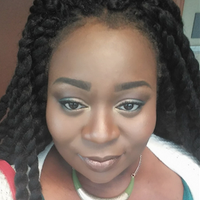Mayowa Adegboyega
 Department
Department
Anthropology
Program and Year of Study
PhD, 3rd year
Previous degrees and colleges
BS Biology, Howard University
Where did you grow up?
I spent my entire life up until the age of 17 in Lagos, Nigeria where my entire family is from, until I moved to the United States for college.
Where do you live now?
Davis, CA
What's your favorite spot in Davis?
I love going dancing at Sophia’s Thai Kitchen on their Salsa Nights.
How do you relax?
It’s funny because I’m either curled up under a blanket on my couch and watching TV, or cooking with a group of friends while watching a movie, and loudly arguing about politics and pop culture.
What was the last book you read for pleasure?
Luvvie Ajayi’s I’m Judging You: The Do-Better Manual. It is a collection of hilariously witty truth bombs about life, culture, social media and fame.
What was the last film you saw at the theater?
Jordan Peele’s Get Out. It did such an amazing job in explaining the complexity of being black in a white space using horror movie tropes.
Research interests
I am interested in understanding the evolution of the human body to explain how and why we arrived at the anatomical configuration we now embody. Humans, unlike other primates, primarily walk upright, have very large brains, and have evolved a unique birthing mechanism that reveals a trade-off between large brained babies and upright posture. The sparseness of the fossil record makes it difficult to study our evolution, so my thesis project is looking at using the recent technological advances like 3D imagining and printing, and geometric morphometrics to recreate early fossils, and to answer questions about their shape and size.
Dissertation title or topic
The Evolution of the Hominin Pelvis: Technological Solutions to the Incomplete Fossil Record
Please share a surprising or noteworthy fact or finding from your research
Modern human babies are the only primates that rotate twice to get out of the birth canal. Early humans had a wider (from left to right) birth canal at the inlet and outlet so babies only had to turn once to get their shoulders out. When modern humans with really large brains arrived some 200,000 years ago, our narrow bodies (for efficient bipedal walking) would not have been able to handle such births, so we increased our front-to-back outlet length to accommodate both requirements, thereby requiring that babies twist twice before coming out.
Which professor or class inspired you to pursue graduate studies?
I was inspired by a lot of people but mainly Dr. Mary McKenna. I took her Evolution and Ecology class at Howard which was so thought-provoking and she singled me out to tell me about the UC-HBCU Initiative programs that allow students from Historically Black Colleges and Universities to do summer research at a UC school. I spent 8 weeks in Dr. Peter Wainwright’s lab studying the evolution of fish vertebrae and its effects on locomotion and the rest is history.
Which scholarly text do you wish you had written? Why?
Svante Paabo’s Neanderthal Man: In Search of Lost Genomes does a great job outlining the tedium and excitement of science. He happened to make discoveries that few other people could dream of and the book takes us through his process and life at the time. It is a great read for those interested in genetics, human history, and understanding the Neanderthal and modern human relationship.
Which other researchers at UC Davis are doing work that particularly interests you?
Dr. Nicholas Zwyns in my department is doing some interesting things using geometric morphometrics and computer learning to detect the archaeological industry a stone tool belonged to.
Dr. Peter Wainwright in the Ecology and Evolution department is doing some interesting research on the functional morphology of fishes and other vertebrates focusing on locomotion; phenotypic plasticity; complexity; diversity.
What’s the best thing about being a grad student?
I love being in a collaborative learning environment. There are many opportunities to travel for conferences and data collection. I like the flexibility of my schedule, and last but not least, my lab group, Paleo Group, is made up of the coolest and most intelligent people alive!
What's the worst?
When the lab computer crashes for the 5679439545th time in one morning.
If you weren’t a grad student, what would you be doing?
Before I decided to go to grad school, I had wanted to go to medical school. In fact I had to do a pro and con board to choose UC Davis. P.S. I’m glad I did.
Finally, please ask yourself a question
What advice about UC Davis would you give a student coming from your neck of the woods?
Come with an open mind. It will be nothing like where you were living and the small-town life might drive you nuts for a while. But, you will meet some amazing people and make the type of friends you’d never have thought you would have. You will get to experience life in a new way and discover commonalities with people who are not like you. It’ll be one of the best decisions you ever made in your life. Trust me.
— May 2017
